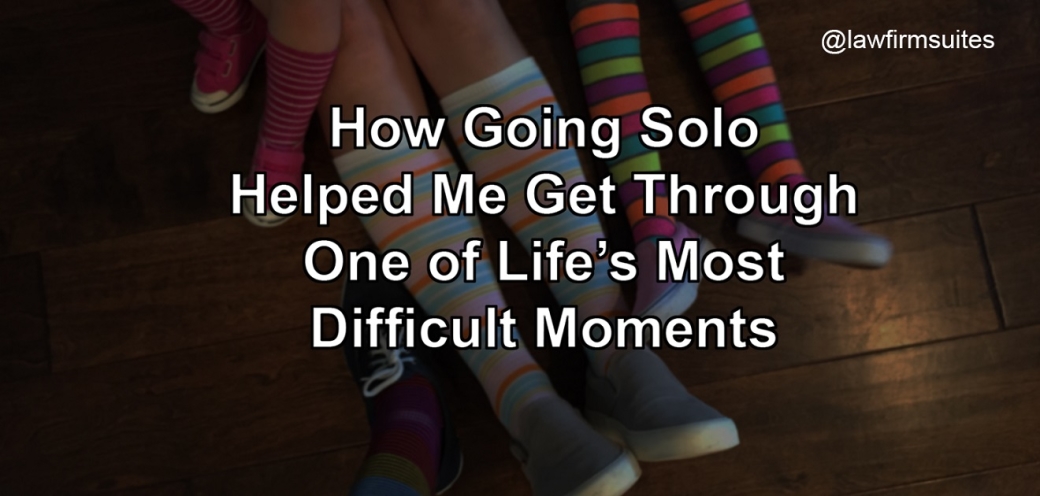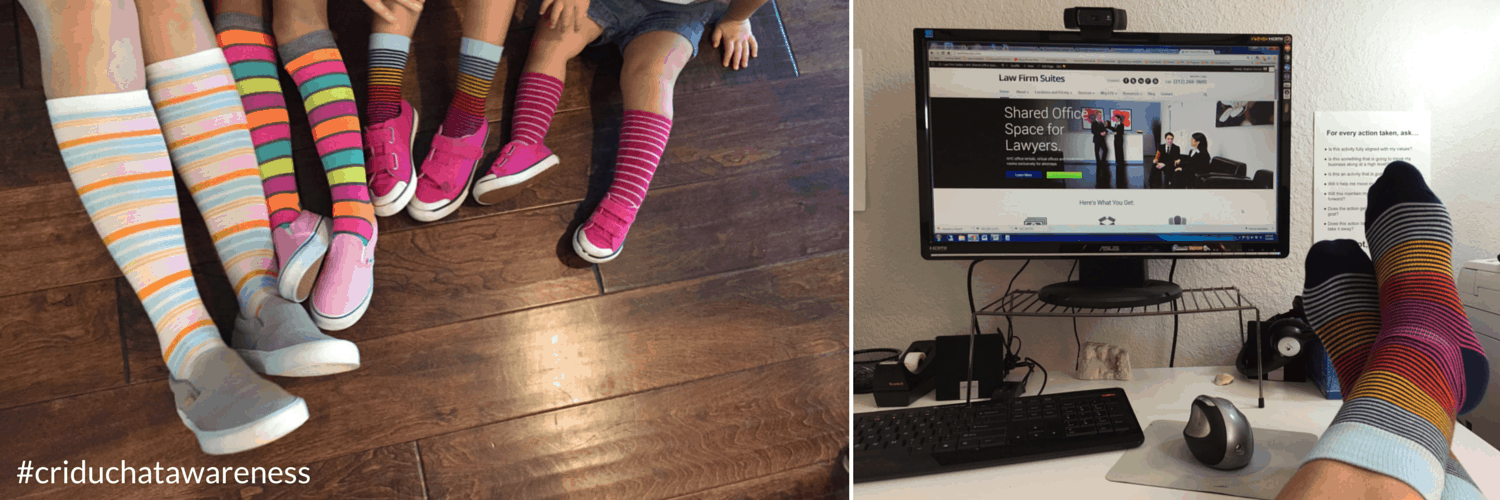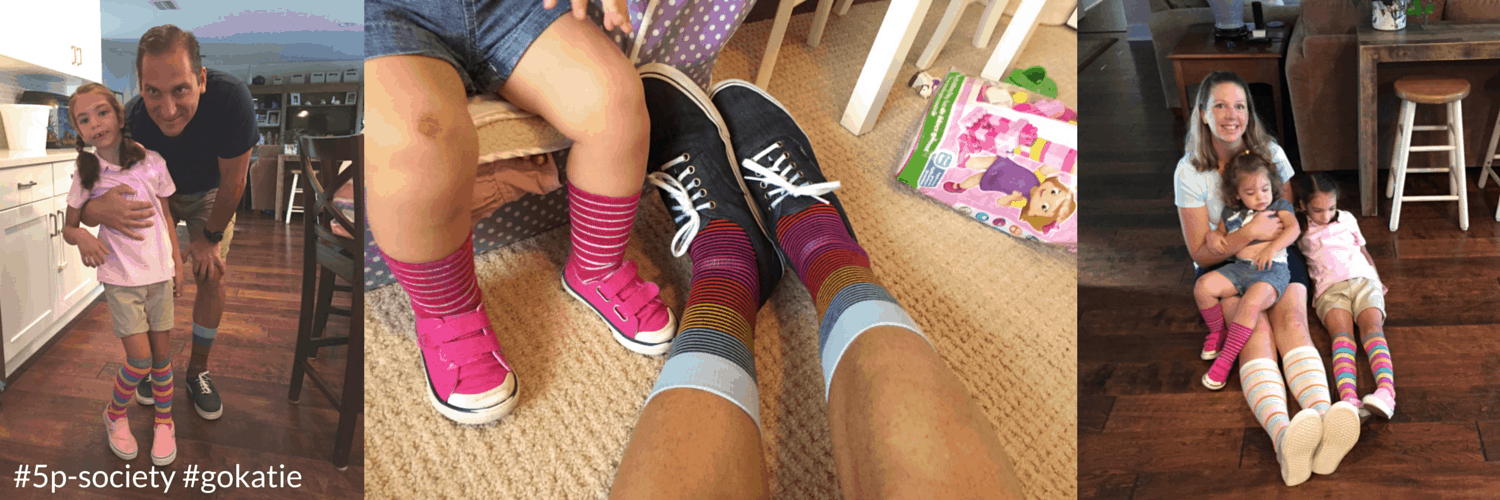One of the most unexpected benefits of going solo: teaching you the skills to get through life’s most challenging moments.
In early October 2008, my wife and I huddled together in a hospital room in Greenwich, CT awaiting the birth of our first daughter, Katie. For several hours we had been killing time by watching the American banking system implode on cable news.
Apart from the prospect of a very uncertain economic future, the uneventful delivery was the culmination of an otherwise normal pregnancy. We were proud to welcome a new baby girl into the world.
Two months later we were at our pediatrician’s office for a routine visit.
As the doctor hovered over our baby girl she says to us, seemingly out of nowhere: “You know, your daughter has an unusually small head, low muscle tone and she cries like a kitten. I think she may have a genetic syndrome. Let’s get her tested.”
What?!?
My wife and I looked at each other thinking incredulously, “Did we just hear that correctly?”
We went in expecting some crying from shots and left with a child who potentially had a debilitating disability.
Our doctor’s questionable bedside manner notwithstanding, she was spot on. Two weeks later genetic testing confirmed that our daughter was afflicted by Cri du Chat, a rare genetic syndrome that affects 1-in-50,000 children (it’s also known as 5p- Syndrome).
French for “cry of the cat”, Cri du Chat is caused by a chromosomal deletion. Like autism, it’s a spectrum disorder. It’s name comes from the kitten like sound that infants make when they cry.
You can read more about the syndrome here.
In an instant, our lives had changed. No need to get into the gory details of what follows when you get news like this. Dozens of parents who are more emotionally adept do it better on The Mighty every day.
Suffice to say, for a good year after the diagnosis my wife and I were a mess.
Today I’m sporting a pair of colorful striped socks to celebrate Cri du Chat Awareness Week (a tradition in the 5p- community), and to support Katie and all the other families affected by the syndrome.
If you are interested, you can read more about the syndrome and my family here, and here.
Throughout the course of a career in the law, serious life events are going to come up that will, at a minimum, require you to take time out of the office, and perhaps make you question your purpose in life.
In my case, having my own law practice ended up helping me through the aftermath of the diagnosis in ways that I didn’t expect.
My time is flexible, which allowed me to take the time off I needed guilt (and hassle) free.
As you can imagine, after the diagnosis there were many hospital visits and medical tests. Once the severity of the health issues were fully understood, we embarked on what will be a several decade process of getting services for our child (speech, OT, PT, ESE), then managing all of these therapists coming in and out of our home.
Because I make my own schedule, I had the time to attend all of these meetings. This was helpful in getting a handle on all the medical issues and therapies.
By choice, I missed a lot of work time during the first year of the diagnosis, and I was able to do it guilt and hassle free.
Had I still worked for a firm I’m not so sure that management would have been so understanding, and even if they were, knowing myself, I would have felt guilty about it.
With the economics of being a self-employed lawyer, I didn’t have to bill that many hours to cover my family’s expenses.
Although I ended up taking a lot of time off during the first year of our diagnosis, it didn’t cause financial ruin. The reality is, at our billable rates, you don’t need to work that many hours a week to be able to cover your expenses.
Of course, you still need to put in marketing time to keep new business coming in. But I had previously put marketing systems in place that had other people doing the execution (newsletter publishing and regular reach out to existing clients).
I also shifted much of my marketing activities to more of a “one-to-many” approach (like blog writing, PR and speaking). This required me to spend very little time to get in front of many prospective clients.
Sure, I had to take my foot off the gas a bit which resulted in a slight slow down of new business, but my pipeline never went completely dry.
Before going solo, I scaled back my personal expenses, making it easier to support my family with less income.
Before going solo I was working for a large-ish law firm and was compensated accordingly. As fast as the money came in I spent it. At least among the colleagues with whom I was close, this seemed to be part of the firm’s culture.
When I went solo I started with no clients and was unclear when or if I would be able to earn a living. I had a fixed amount of savings and when that ran out I would be back to looking for a firm job.
I materially scaled back my personal expenses when I went solo, and that mindset continued even after I replaced my income. I learned the hard way that there will be lean months and if you want to continue to have the freedom of being self-employed, you better keep your expenses low.
Our diagnosis was the ultimate in the unexpected, and my income did go down during that period. But we were prepared to handle it.
Our motto at home continue to be: “Carry Small Nuts”.
Being self-employed taught me how to quickly adapt to change.
As attorneys we are trained problem solvers. But knowing how to solve legal problems for others and being able to issue spot and adapt quickly for ourselves can be two very different skills.
The former I learned in law school, the latter I learned by being self-employed.
When you go solo, you have no choice but to develop the skill of adaptability. Eventually your biggest clients leave, key staff quits, your pipeline dries up unexpectedly or your best marketing channel gets disrupted.
When you’re self-employed, every critical change in your practice has a direct effect on the balance of your personal bank account.
If you want to be your own boss and don’t learn how to adapt quickly, you won’t last. Either market factors will drive you out of business or the stress will kill you.
This skill proved to be invaluable after our diagnosis. On the personal front, our expectations about parenting changed in an instant. We had to learn an entirely new set of skills to manage the care of our daughter and our household.
On the professional front, the amount of time I could commit to work would be materially less, as would the amount of mental energy I could devote to it. My practice could no longer be my baby, it needed to grow up quick and be a lot more self-sufficient.
The ability to adapt to a rapidly changing landscape and quickly implement new strategies ensured the success of my practice and the health of my family.
The community of other lawyers in my shared law office space was an unexpected source of support.
The whole reason Law Firm Suites exists is because I truly believe that the community we have here helps lawyers in ways that you can’t imagine. I know because I have benefited from it first hand.
One of the challenges we face as solos is isolation. It’s one of the most common complaints we hear from other solos.
You don’t realize how much you rely on a community of co-workers until you don’t have access to it any longer. It can be lonely as a solo, especially in times of stress.
In 2008 when this all went down I confided in a few of my suitemates. Those guys kept tabs on me over the next few months. Nothing crazy, these are guys who are as emotionally inept as me, so we are not talking about heartfelt hug-a-thons.
They just made it clear that they were available to lend an ear and that they had my back if I had trouble getting a project done.
It was reassuring for me to know I had that support, and I would have done the same for them had the roles been reversed.
Lawyers in my shared office were an unexpected source of support after an unexpected diagnosis Click To TweetWhen I was no longer inspired by my practice, I had the confidence to make a change.
Sometimes there are moments in life where you are forced to reevaluate who you are as a person, what things should be a priority and how you can better be of service to others.
My daughter’s diagnosis was one of these moments.
I was a good business lawyer and I made a good living at it. But after the diagnosis, I found it unfulfilling (or at least parts of it).
Negotiating reps and warranties in purchase agreements was no longer inspiring. Begging investment bankers to send dealflow became intolerable.
I knew it was time to make a change, and I did.
I scaled back my practice to service only the types of work I enjoy. I ramped up another business that was more fulfilling, and I started using my legal skills to help families with special needs kids on a pro bono basis.
These were big changes, and not without some financial risk. But going solo had given me the confidence that I could make big professional changes and still be OK.
I know many well-compensated, successful lawyers who are miserable with firm life, but they are terrified to make a change. For some it’s the fear of taking a step back financially. For others it’s the fear of reinventing themselves. And for others it’s the fear of being judged by their peers.
For them, the fear is paralyzing and they don’t take the risk.
But once you do it for the first time, you’ll never put up with being miserable again (at least not professionally). The fear is still there, but you learn how to manage it.
Without having gone solo, I could have easily been one of those other lawyers.
An update 6 years later.
Six years ago, the pediatrician with the bad bedside manner gave us the most prophetic advice.
When we asked her, “So what do we do now?” She told us “You take her home and you love her, the same as you would have done before.”
Those are words that we live by.
Today, Katie is in an inclusion kindergarten class with her typical peers. She is now flanked by two little sisters, and the three of them play (and fight) like any other siblings. Katie loves her iPad, is obsessed with animals, especially dolphins and cats, and is the love of our life.





on said:
Great column and something I can totally relate to. I stopped practicing for close to 20 years after my daughter developed a severe seizure disorder, along with developmental delay and autistc spectrum disorder. Although I managed to stay in the legal field in a non-practicing manner, I kept looking for a way to do formally what I had been doing informally for many years – using my legal training and skills to assist families who had a member with a disability. It took a while (!) but I finally made the jump last summer and opened my own part-time law practice that focuses solely on disability-related issues. It’s been an interesting 10 months but so far I am loving it. I finally feel like I am doing what I meant to.
And oh yeah, I love the striped socks. Our family’s big thing is the colour purple – for Purple Day (dedicated to epilepsy-awareness). http://www.purpleday.org/
on said:
Thanks for your comment Michelle! I hope you continue to find enjoyment in your new practice area. We’ll have our Purple on on March 26!
on said:
G-d bless you and your family. May you all go from strength to strength and from joy to joy.
on said:
Thanks Adam!
on said:
You are my HERO!
on said:
Thanks Aimee!
on said:
Thanks Stephen. Inspiring article.
on said:
Thanks Preston!
on said:
Stephen:
I have been saving your email all these weeks so I could get a chance to read it. I always get something these posts. Your article was excellent. One of your best.
Regards,
on said:
Thanks Angela! I appreciate the kind words.
on said:
Thank you for writing about a very personal and sensitive topic, I found it very inspiring. This is the first time I read about a story that is so similar to mine. I admire your strength.Best wishes to you and your family.